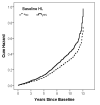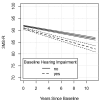Relationship of hearing loss and dementia: a prospective, population-based study
- PMID: 24662628
- PMCID: PMC4024067
- DOI: 10.1097/MAO.0000000000000313
Relationship of hearing loss and dementia: a prospective, population-based study
Abstract
Objective: To determine whether baseline hearing loss increases cognitive decline and risk for all-cause dementia in a population of elderly individuals.
Study design: Longitudinal cohort study.
Setting: Community-based, outpatient.
Patients: Men and women aged 65 years or older without dementia at baseline.
Intervention(s): All subjects completed the Modified Mini-Mental Status Exam (3MS-R) at baseline and over 3 triennial follow-up visits. Hearing loss (HL) at baseline was based on observation of hearing difficulties during testing or interview. Incident dementia was determined by clinical assessment and expert consensus.
Main outcome measure(s): Dementia and 3MS-R score.
Results: At baseline, 4,463 subjects were without dementia, 836 of whom had HL. Of those with HL, 16.3% developed dementia, compared with 12.1% of those without HL (p < 0.001). Mean time to dementia was 10.3 years in the HL group versus 11.9 years for non-HL (log rank test p < 0.001). In Cox regression analyses controlling for sex, presence of APOE- [Latin Small Letter Open E]4 allele, education, and baseline age, and cardiovascular risk factors, HL was an independent predictor of developing dementia (hazard ratio = 1.27, p = 0.026 [95% CI, 1.03-1.56]). Linear mixed models controlling for similar covariates showed HL was associated with faster decline on the 3MS-R, at a rate of 0.26 points/year worse than those without HL.
Conclusion: Elderly individuals with HL have an increased rate of developing dementia and more rapid decline on 3MS-R scores than their nonhearing impaired counterparts. These findings suggest that hearing impairment may be a marker for cognitive dysfunction in adults age 65 years and older.
Figures



References
Publication types
MeSH terms
Grants and funding
LinkOut - more resources
Full Text Sources
Other Literature Sources
Medical
Miscellaneous

